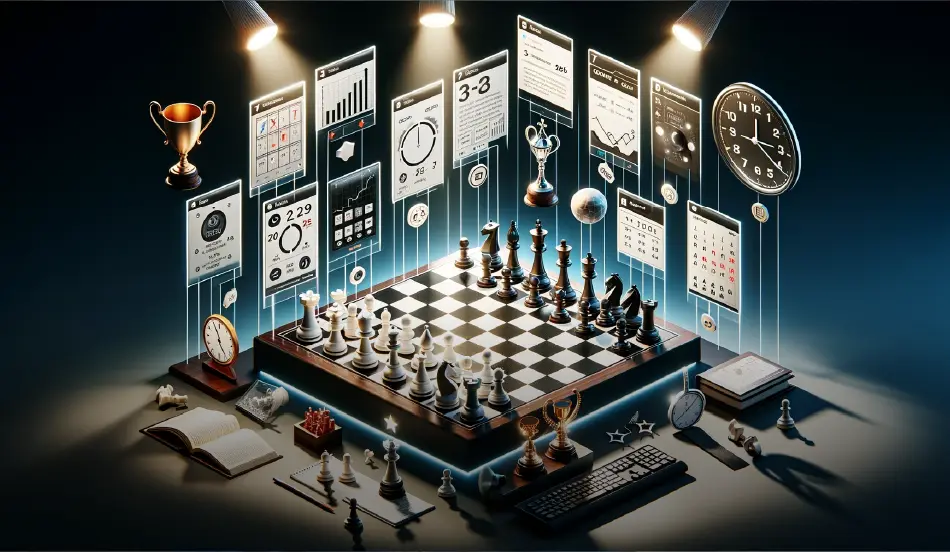7-Step Plan to Succeed in Chess in 2024
GM Noël Studer shares how you can train effectively, stay inspired, be consistent and more.
GM Noël Studer shares how you can train effectively, stay inspired, be consistent and more.

Time flies, and we’re already several weeks into the New Year.
To ensure you can stick to your training throughout this New Year or finally give yourself the push you need to start training effectively, I want to give you a 7-step plan to success.
For every of those 7 steps I wrote an article on my Blog. To make it simpler for ChessMood readers to start, I’ve compressed what you absolutely need to know in this article.
Whenever you want some more insights on a single step, just click the link of the headline and read the full article on the step.
Step #1: Get Rid of Your Bad Habits
Step #4: Maximize Impact With the 80/20 Principle
Step #5: Craft a SMART Chess Training Plan
Step #7: Get Inspired by Real Chess Improvement Stories
If you want to change the outcome, you need to change the input first.
“Insanity is doing the same thing over and over again and expecting different results.” — Often attributed to Albert Einstein, but likely not said by him.
The best way to change your input is to change your habits. With the right habits in place, making the right decisions suddenly becomes simple and easy.
Why?
Because habits are what you do on auto-pilot. In 2023 you might have played mindless games for several hours every day on auto-pilot. If in the New Year, you instead just do 30 minutes of high quality training, your results will be vastly different.
Not only will you spend less time on nonsense (and chess overall), but you will improve much quicker than before.
So how do you get better habits? By destroying your bad ones first.

This is an idea I got from the fantastic book Digital Minimalism. The Author, Cal Newport, suggests taking a detox from your old, bad habits before building up new ones.
I’ve done such a digital detox twice with huge results. That’s why I recommend a Chess Detox for everyone trying to improve their chess consistently. Here is how you do it:
For 7 days (the original Detox is 30 days, but that is a very long time), stay away from any chess-related activities.
No chess Twitter.
No YouTube videos.
No online games.
A complete Detox. Use this time for other hobbies, to get some sleep, and explore nature.
When you stay away from your bad habits for this period of time, it will be much easier not to click “play game” once you return to your Desktop.
The next 6 steps will help you come up with a good chess routine you can put into place after your detox.
Way too many chess improvers get stuck because of a faulty, rating-focused mindset.
Overly focusing on your current rating is robbing you of many opportunities to learn. Missing out on those opportunities means you will improve less and… be lower rated in the future.
Remember this:
Focusing on short-term rating = damaging your long-term rating goals.
Instead of thinking, “How can I get the best possible result today?” you need to start thinking, “How can I learn the most every day?”
When I made this switch in my own career, I experienced three major changes:
- I enjoyed Training with a learning focus more
- Losing a game didn’t hurt as much (I learned something!)
- It was easier to keep motivated in periods without competitive games (COVID-19, for example)
The most important change you can make to switch your mindset is to set skill-based goals instead of rating-based goals.
Don’t say, “I want to reach a 2050 rating by December 2024.” but instead focus on several skills you want to learn in this year.
For example:
- Implement a correct thought process in 10 games
- Play 5 Blitz games without blunders in a row
- Do not tilt for 1 month straight
- Learn the ideas of the Scotch Opening
By having goals that are entirely skill-based, you make sure that you can learn something even if the short-term results aren’t going your way.
A student of mine recently set a goal of preparing for his first OTB tournament (aged 60!); another just wants to “have more fun during a game.”
Reaching a skill-based goal will always indirectly help you to raise your rating. But it takes away the pressure on short-term results and makes studying chess so much more fun.
I love what Avetik’s father told him in his childhood.

Training should be harder than competition. World-famous Coach Ramesh RB has taught me this principle better than anyone else.
The success of his students (more than 50 gold medals at World Youth Championships, Candidates Qualification of Rameshbabu Praggnanandhaa) speaks for itself.
Once I applied this principle to my own training, I got a huge boost: I won roughly 100 points in less than a year. This is a huge jump on Grandmaster Level.
I’m not going to lie to you: training hard can suck! Just like going to the gym, what is great for your body & mind, is not always the most fun. But those who can push themselves to do the hard things have a huge advantage in life.
So my suggestion is rather simple. Push yourself to do something hard today, tomorrow, and after tomorrow. Going out of your comfort zone three days in a row will initiate a habit of doing so on a daily basis.
If you said yes to the Chess Detox, find hard things in other areas of your life. That’s the fun part: once you get used to doing hard things in one area, doing something hard in another will become easier as well.
The biggest benefit I haven’t mentioned yet is that suddenly, playing a game will feel easy. When you push yourself to the boundaries in training, a game will suddenly feel like play.
After working with Ramesh and Aagaard in a very exhausting training camp, I often thought to myself during a game: “This position is hard, but way easier than some of the annoying exercises Ramesh or Aagaard would give me.”
It usually involves using your own head, without any help, to solve a position that is slightly outside your comfort zone.
Failing to solve this position must be an option. My sport psychologist always told me I should aim for roughly a ⅔ completion rate, both with goals and exercises.
That means one out of three times, I should be wrong.
Use a book, an online tactic trainer or ChessMood puzzles from Videos to challenge yourself.
Do not move any pieces before having fully calculated a position.
Write down your solution.
And only then execute and compare.
It might not be easy. But it will be worth it.

Many improvers get stuck even though they put in a lot of time.
Two main reasons: they don’t train hard enough (you should now know how to do so!) or they don’t spend time on the important things.
Imagine learning for an exam with 5 subjects. Two subjects will give 80% of the points, while the other 3 will give 20% of the points.
Are you studying everything for the same amount of time?
No, that would be stupid! You should focus on the subjects that matter more. This increases your chances of being successful in the exam.
The same goes for Chess. Some areas matter more than others. You should account for that and focus on the few areas that give the most points (decide most games!).
This is the so-called Pareto principle, or easily the 80/20 principle. It says that wherever, in chess, business, or science, 20% of inputs account for 80% of outputs. Someone studying effectively should find the 20% areas and focus much more on them.
This will help them study for less time and get better overall results.
I want you to think in a 80/20 way whenever you pick new study material. Be aware that life is always a trade-off and picking bad material, or even merely good material, will mean you don’t have time for the super amazing material.
So instead of asking yourself “Is this good?” ask “Is this essential?”

Let’s get concrete. If you followed the first four steps, you:
- Got rid of old habits
- Changed your mindset to skill-focused
- Did some hard things
- Focus on what really matters
It is time to put those all together and form your Training Plan. This step is about doing what you know would be good.
I won’t tell you how important forming a plan is. I’ll leave this to one of my Students. Kalea Chapman, a Next Level Training student said:
“When I sit down to train now, I know exactly what I’m going to work on and I have confidence about the material… I’ve never been happier with my training.”
The clarity a plan can bring is astonishing. If I say “I’ll go to the gym twice this week”, I’m very likely to look back on Sunday and think “oh shit, I didn’t go to the gym”.
If instead, I say “Monday 8.30 AM and Thursday 3.30 PM I go to the gym this week,” I go nearly every time. A small plan and commitment can change everything.
A good plan is SMART:
- S for Specific
- M for Measurable
- A for Achievable
- R for Relevant
- T for Time-Bound
To create your first training plan, think about your average week. Divide the number you think you can study by 3.
This is the amount of time you start with.
Why so little? Because we all over-estimate how much we can do. It is better to start small and follow your plan than to start grandiose and fail to follow the plan in the second week already…
Now look into your calendar and find time slots that should be free for chess training on a regular basis.
If you think 20 hours is feasible, you start with 7 hours (⅓ of 20). So your task is to find 7x 1-hour slots throughout the week where you can study chess.
To be able to recharge, I recommend taking one day off per week (I always took even two days off chess).
Do not finish reading this article before you’ve found these slots and committed to studying chess. It is better to start with 6x 15 Minutes than dreaming about doing 6x 3 hours but never actually doing anything.
Last but not least, when you find the slots, write down the type of training you do in each slot. To start out simply, I recommend:
2 Tactics Sessions
2 Play + Analyzing Sessions
2 Sessions of either Openings, Endgames, or Strategy.
Boom, you’ve got your first plan. Be proud of yourself. You are nearly there.

I’m not here to promise you results without hard work. On the opposite, I want to tell you the cold harsh truth:
This won’t be easy. Nor will you always stick to your plan perfectly.
That’s why it is best to prepare for roadblocks along the way already now.

Even with Steps 1-5 perfectly done, Life will get in the way sometime in 2024 and you will miss a training session. The only way to get through these periods is to:
I want you to think right now of things that could interfere with your newly written Chess Training plan.
Do you have upcoming exams for University? Or is there a certain period that is way more stressful for your Job?
No matter what it is, if you can anticipate roadblocks you will have a huge advantage over other chess improvers. Your consistency will outperform nearly everyone else over a longer period of time.
Action Step: Write down 3 likely things that can mess up your chess study routine.
For every point, now ask yourself two important questions:
- Can I make this less likely?
- How can I spot the problem before it is too late?
Use prophylaxis also off the Chess Board!
But as mentioned above, even the best preparations will fail. You might get sick, have a family emergency, or have a particularly difficult period of life.
And then it happens: you miss a training session. That’s okay. It happens to everyone. To quote James Clear again:
The first mistake is never the one that ruins you. It is the spiral of repeated mistakes that follows. Missing once is an accident. Missing twice is the start of a new habit.” — James Clear
Your goal shouldn’t be to never miss a training session. That’s utopic. What you should aim for it to never miss twice in a row.
Otherwise, you will soon need to read this article again and start from Step #1: Get rid of your bad habits…
What I do personally is to write a Training diary for anything I want to improve. Keeping track of my process is motivating, and it helps also to quickly spot if I missed a session.
Whenever I do miss a session, I want to take immediate action to get back on track:
- Do a small proper training ASAP (can also be 10 minutes)
- Plan a session for the next day
- Use the motivation to write a more realistic plan I can stick to
Remember: the whole chess improvement journey is about consistency. You don’t want to go hardcore for 30 days and then fall off the habit for 3 months. Instead, start small, get a habit of doing important chess training and never fall off of it again.
I’m happy to share that I have a streak of 60 weeks working out in a row. The aim is always 2 sessions a week. I’m not always getting two sessions in, but I never have 0. That’s what matters!
I’ve kept the most important part as last. If you’ve made it up to here you are truly motivated, dedicated and deserve to believe in yourself.
That’s exactly what you need to succeed. There is no way in training with a clear plan if you don’t think you can improve your Chess.
So let me tell you one of my favorite Chess improvement stories.
When I was still a professional player a 70-year-old gentleman named Albert approached me for chess coaching.
I didn’t have much time, but we settled on one 1.5-hour training session roughly every month. That’s not a lot. But as always, I went into this Coaching relationship aiming to help my student improve.
Albert wasn’t convinced he could get better at his age. After a 50-year Chess hiatus (career and life got into the way…) he just wanted to avoid getting worse at his 1600 Level.

Nearly exactly one year after starting the coaching, roughly 12 Sessions in, Albert played his first ever 9-round FIDE rated tournament.
The result: A positive score (5/9) against exclusively higher-rated players and an initial FIDE rating more than 150 points above the national rating he had when we started working together.

Not only the results were great, but the games were all long and hard fought. Albert managed to keep concentration high and tricked an 8-year old prodigy after nearly 5 hours of play…
You read that right. The 70 year old tricked the 8-year old after 5 hours of play. Here is how:

After luring the black Rook to g2, Albert gave a check on a3. His young opponent seemed super confident after playing 65…f3, blocking this check. Only for Albert to play 66.Rxf3+! And shock his young opponent.
If black takes the rook it is stalemate, and after 66…Kg4 you can keep picking up pawns with 67.Rxh3! And an easy draw.
This was a huge revelation for my ensuing coaching career. I got the confidence that everyone can improve if they do the right things. It is how I look at chess improvement until this day. If you:
- Put in the time + effort
- Use principles that work in every area of life
- Focus on skills instead of rating points
- And are patient
You can and will improve your Chess eventually.
I’m not saying we can all be GMs. That’s not true. But that’s also not what you should measure yourself with.
What matters is that you can improve your skills and thus improve your results with consistent, smart Chess Training.
I hope you will show this to yourself in 2024. I believe in you.
Here is to a great Year,
Noël
***
P. S. Feel free to share your thoughts about the article, about Noël, gratitude or bad (lol) words to Noël and anything else (almost anything, lol) you want in our forum.
Originally published Jan 16, 2024

